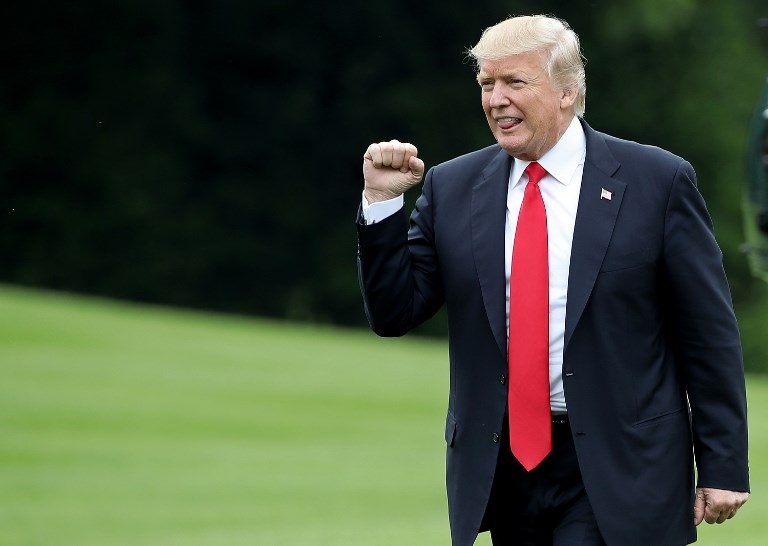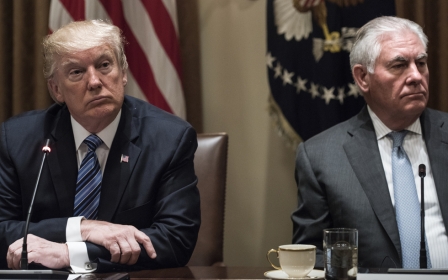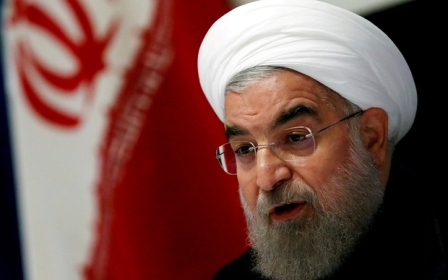Four ways Trump could kill the Iran nuclear deal

Among the sea of global media reports and expert analyses, one can clearly detect that the survival of the landmark 2015 Iran nuclear agreement – also known as the Joint Comprehensive Plan of Action (JCPOA) – is in jeopardy.
According to reports, President Donald Trump has already made up his mind not to certify Iran’s compliance with the JCPOA before the next deadline in October by when he must notify Congress. Many experts believe that such a move will destabilise, and eventually scrap, the Iran nuclear deal. In theory, the Americans can attack the nuclear deal with Iran from four angles.
1. Go after Iran’s ballistic missile programme
American officials, including Trump, have repeatedly stated that Iran's testing of ballistic missiles is antithetical to the spirit of the JCPOA. Why the spirit and not the letter? Because there is no mention of the Iran missile programme in the accord. It is unlikely that the Europeans, given the likely consequences of such a move, would go along with the US and scrap an international agreement, which is also endorsed by the UN Security Council, by relying on the argument that the agreement’s spirit has been violated.
Nevertheless, Iran’s ballistic missile programme is discussed in Resolution 2231, which endorses the JCPOA. However, the interpretation of that part of the agreement is in dispute. On 2 August, in a joint statement, Britain, France, Germany, and the US condemned Iran’s 27 July satellite launch in a letter to the UN. But interestingly, they claimed that “the program to develop ballistic missiles continues to be inconsistent [not in violation] with UN Security Council Resolution 2231".
One crucial point to remember is that even a violation of Resolution 2231 cannot be interpreted as a violation of the JCPOA. The Russians also contend that the missile issue “is not a violation of the [nuclear] agreement”. As such, this route for killing the nuclear deal appears to be a dead end.
2. File a complaint with the JCPOA joint commission
The Joint Commission of the JCPOA is tasked with supervising the implementation of the nuclear deal with the objective of resolving the problems that arise on the way. The commission is comprised of representatives of Iran, the P5+1, and the EU High Representative.
As astute observers may notice, the US may potentially have five votes – its own, the three European countries, and the EU H.R. – of the total eight if a vote is made on a decision. However, to establish Iran’s violation of the nuclear accord, the Americans should provide the group with clear evidence and the International Atomic Energy Agency (IAEA) must also confirm such a deviation. Thus far, the IAEA has repeatedly verified Iran’s compliance.
This path seems to be closed as well, as it is unlikely that the Europeans and the IAEA would confirm Iran’s non-compliance at the cost of a colossal international crisis simply at the behest of the Americans.
3. Pressure Iran with more inspections
Many reports maintain that the US administration is trying to force IAEA inspectors into military sites where US intelligence indicates that Tehran may be cheating on the deal.
According to the Associated Press, Senator Bob Corker, who chairs the Senate Foreign Relations Committee, alluded to this strategy, saying that the US was trying to “radically enforce” the deal by asking for access to “various facilities” in Iran. “If they don’t let us in, boom,” Corker said.
In theory, this road could give Trump what he wants. But in practical terms, the issue of accessing suspected sites by the IAEA, covered under paragraphs 74 to 78 of Annex I to the JCPOA, is an extremely complicated process. To begin with, the IAEA must find evidence to prompt its suspicions.
The Europeans and the IAEA should not only fully cooperate with the US to push for obtaining access to a military base, but should also consider the real possibility that Iran denies them access. In other words, the predicted mechanism in this respect is aimed at removing suspicions, not killing a landmark international agreement.
4. Provoke Iran to rescind the deal
On 21 July, Senator Corker said, “You want the breakup of this deal to be about Iran. You don't want it to be about the US, because we want our allies with us.”
Some experts view the imposition of new sanctions on Iran under the recent Countering America’s Adversaries Through Sanctions Act - which Trump signed into law on 2 August - as part of this strategy to press Tehran into a corner.
Iran, however, as repeatedly mentioned by various officials, will not fall in a US trap and will not walk away from the deal as long as major sanctions (such as on its energy and banking sector) are not re-introduced. Iran will protest, expand its ballistic missile programme, and will strengthen its military relationship with Russia. It will not, however, rescind the deal.
Why America won't abandon the deal
Considering this context, Trump is unlikely to certify Iran’s compliance with the nuclear agreement in October. Subsequently, he may not extend the sanctions’ waivers, either partly or in whole. This would be an indisputable violation of the JCPOA.
The Europeans, Chinese, and Russians will protest, as did France on 26 July by calling the new US sanctions “illegal” and “at odds with international law due to their extra-territorial reach". But that would be it. In practical terms, the hands of the other members of the P5+1 in taking any retaliatory action against the US are tied.
At the same time – and without tearing apart the nuclear agreement – Trump may decide to let companies that already work and do business with Iran off the hook and continue without any consequences.
But why then, some may ask, did he reintroduced sanctions that had been suspended as part of the nuclear deal? The answer is that with those sanctions in place again, the US administration has the option to broadly penalise non-American companies, banks, and institutions working with Iran.
Therefore, whether the US chooses to punish companies or not, the sanctions will work as a sword of Damocles hanging over the heads of any foreign entity who works with Iran. Simply put, foreigners will be very cautious entering the Iranian market. Consequently, Iran will be under the siege of American sanctions - and Trump won’t need to cancel the agreement because he would have what he wants.
What will Trump demand?
Trump will most likely demand, as he has repeatedly stated, a renegotiation of the deal. One can read between the lines to determine what the Americans expect to happen. US Secretary of State Rex Tillerson has said that the nuclear deal “fails to achieve the objective of a non-nuclear Iran” and "only delays their goal of becoming a nuclear state".
So the American strategy is to put immense pressure on Iran to bring it back to the negotiating table. They will most likely demand changes to the agreement's sunset provisions which govern several key restrictions on Iran’s uranium-enrichment capacity and its stockpile of enriched uranium, which will expire after 15 years.
Will the Americans get what they want? Consider this: there is a school of thought in the US that believes dogmatically that sanctions were the only reason the JCPOA was agreed in the first place. This view is flawed.
While it is true that sanctions played a major role in pushing back Iran, no progress would have been made toward the resolution of the nuclear crisis if the US had not abandoned its decade-long policy of “zero uranium enrichment inside Iran".
Notably, even military threats made by the US - and, more seriously, Israel – never bent Iran's resolve. Serious secret meetings only began in March 2013 in Oman after then Deputy Secretary of State William Burns conveyed a message from Obama that he would be prepared to accept a limited domestic enrichment programme in Iran as part of a nuclear deal.
The same outcome will be true here: Iran will not bend on the agreement. If Tehran’s obstinacy is met with sanctions on non-American companies, Iran may very well walk away from the deal, Trump will get what he wants and the world will likely have another conflict on its hands.
- Shahir Shahidsaless is an Iranian-Canadian political analyst and freelance journalist writing about Iranian domestic and foreign affairs, the Middle East and US foreign policy in the region. He is the co-author of Iran and the United States: An Insider’s View on the Failed Past and the Road to Peace. He is a contributor to several websites with focus on the Middle East as well as the Huffington Post. He also regularly writes for BBC Persian. You can reach him at [email protected] or follow him on Twitter @SShahisaless.
The views expressed in this article belong to the author and do not necessarily reflect the editorial policy of Middle East Eye.
Photo: US President Donald Trump pumps his fist as he returns to the White House on 7 June 2017 in Washington, DC (AFP)
New MEE newsletter: Jerusalem Dispatch
Sign up to get the latest insights and analysis on Israel-Palestine, alongside Turkey Unpacked and other MEE newsletters
Middle East Eye delivers independent and unrivalled coverage and analysis of the Middle East, North Africa and beyond. To learn more about republishing this content and the associated fees, please fill out this form. More about MEE can be found here.





